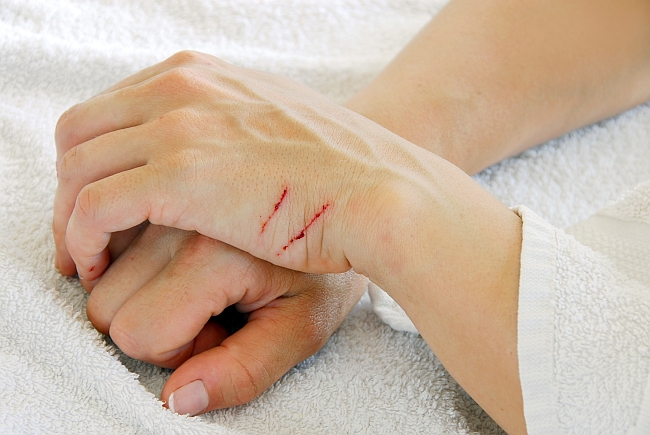
Felines love playtime with their owners, but even the most well-behaved kitty-cats can occasionally get carried away. Anyone that has owned, fostered, watched or bathed a cat knows that getting scratched is not fun, especially if the scrape happens to get infected. Here are some quick tips and words of advice when it comes to getting scratched by a cat.
Cleaning the Wound
The moment you get scratched by the cat, you should stop what you are doing and take care of it right away. (If you are bathing the cat, rise him off quickly and move him away from the water, wrapping him in a towel so that he won’t drown or slip.) Remember that cats hunt, tread on soiled surfaces (such as cat litter), dig and climb, so their claws pick up thousands of germs and bacteria through the course of a day. The sooner you can remove these from your body, the better. Follow these steps:
- Wash the cut with warm water and soap. Some people also follow this by dabbing rubbing alcohol or witch hazel over the cut to ensure all the germs have been cleaned out.
- Dab the wound with antibacterial ointment to seal it, diminish some of the pain, and cover it with a bandage. (This step is particularly important if you have been cut by an unfamiliar or wild cat. The antibacterial ointment will provide an extra line of defense against any infection, since you do not know where those wandering paws have been.)
- If the cut feels itchy or it stings, some cat owners cover the scratch with organic honey (which is an anti-inflammatory) baking soda (which helps remove the stinging in sensitive wounds), or vitamin A or E oil (which helps with scarring).
- Keep the cut covered until it has healed, checking every few days to make sure that it is not infected.
Warnings
Most of the time a simple scrape is not worth worrying about, especially if the cut was cleaned quickly and covered with anti-bacterial ointment. But in some cases getting in a tussle with a feline could result in some pretty serious conditions. For your own safety review the warning below:
- Cat scratch disease: If a cat scratch successfully infects someone or is not cleaned properly, the person might become subject to bartonella, an infectious disease found in the saliva and blood of cats. Sometimes evidence of the disease does not manifest any symptoms until a week or two has passed since the injury. Kittens tend to carry a higher content of bartonella in their saliva than grown cats.
- Further cautions: While anyone bitten or scratched by a cat would be at risk, people with auto-immune diseases should be particularly careful as they may be susceptible to other diseases linked to bartonella. Additionally, pregnant women are at risk from toxoplasmosis, a disease spread to humans from feline fecal matter. (If a cat just eliminated in his litter box, came in contact with feces, and then scratches a pregnant woman, the unborn child could suffer. Toxoplasmosis can harm a fetus, causing birth defects or even miscarriage if not dealt with immediately.)
Note: While complications following a cat scratch or a bite are rare, such an injury should not be taken lightly. Just last year in 2015, a woman living in Toledo, Ohio went blind in one eye after a cat licked it. If you suspect any infection at all, arrange to see your doctor as soon as possible.

